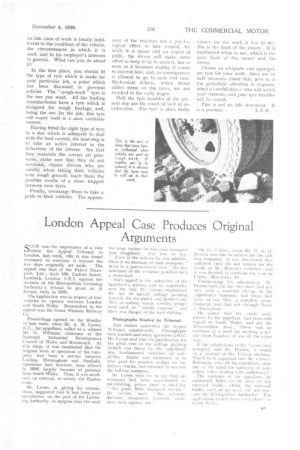London Appeal Case Produces Original Arguments
Page 37

If you've noticed an error in this article please click here to report it so we can fix it.
SUCH was the importance of a case before the Appeal Tribunal in London, last week, thkt it Was found necessary to continue it beyond the
five days originally set aside. The appeal was that of the Palace Transport, Ltd., Arch 196, Carlisle Street, Lambeth, London, S.E.1, against the decision of the Metropolitan Licensing Authority's refusal to grant an A licence, early in 1938.
The application was in respect of four vehicles_ to operate between London and South Wales. Respondent in the appeal was the Great Western Railway Co.
Proceedings opened on the Monday ot last week, when Mr. A. M. Lyons, MC., for appellant, called as a witness Mr. G. Williams, chairman of the National Industrial Development Council of Wales and Monmouth. At this stage, it was mentioned that the original form of operation of the company had been a service . between London. Birmingham and Sheffield. Operation had, however, been 'altered in 1936, largely because of pressKe from South Wales. Thus, it was necdsztry on renewal, to satisfy the Enston onus.
Mr. Lyons, in giving his submissions, suggested that it had been pure speculation, on the part of the Licensing Authority, to suppose that the need for large traders for this road transport was imaginary. For him to say,
Even if the railway be not suitable, there is no shortage of road transport " mast be a preconceived view. No fair summary of the evidence justified such a statement.
With regard to the suitability of the appellant's service, and its superiority over the rail, Mr. Lyons emphasized the use of special stillage packing (mainly for tin plate) and pointed out that, on railway trucks, wooden wedges were used', at " terrific expense and there was danger of the load shifting.
Photographs Studied by Tribunal.
This matter interested the Appeal Tribunal. considerably. Photographs were studied and many questions asked. Mr. Lyons said that the justification for the great cost of the stillage packing (which Was borne by the appellant) was fundamental evidence of suitability. Doubt was expressed as to who paid for wooden wedges on the railway trucks, hut certainly it was not the railway company.
Mr. Lyons went on to say that his witnesses had been uncontested ill establishing, prima tacks a need for " this good, little transport service."
He further said, '' No accurate accurately founded, could have been against me." On the Friday, When Mr. B. de H. Pereira was due to submit for the railway company, it was discovered that sufficient tinm did not remain for the whole of Mr. Percira's evidence, and it was decided to continue the case on Friday, November 18.
Commencing his submissions, Mr. PeCeira took the line that there had not only been a material change in the appellant's business, but there had been, at one time, a complete .abandonment, and that not through illness or fluctuation, He stated that the whole need, proved by the appellant, had been with regard to South Wales, and not the Metropolitan Area. There was no evidence of a need for starting a service from London ; it was all the other win.
If the submissions of Mr. l.yons were accepted, said Mr. Pereira, it would he a reversal of the Enston decision. Was it to be supposed that Mr. Gleeson Robiuson, with all his experience, shut out of his mind the question of suitability when dealing with sufficiency?
The evidence of the appellant, he submitted, failed On the need for the outward traffic, whilst the outward traffic, need or no need, did not concern the Metropolitan. Authority. The application should have sii placed in




















































































